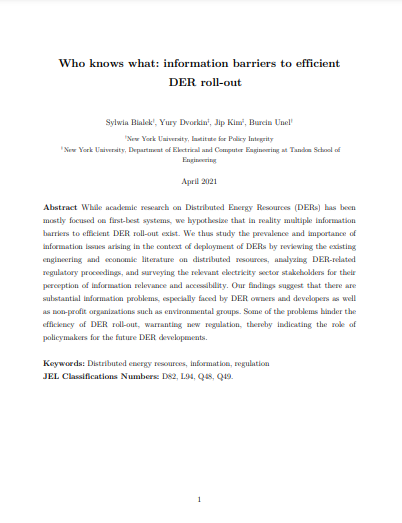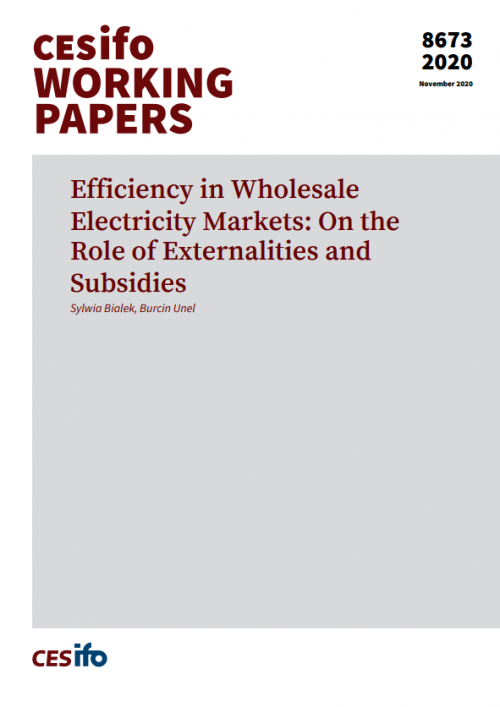-
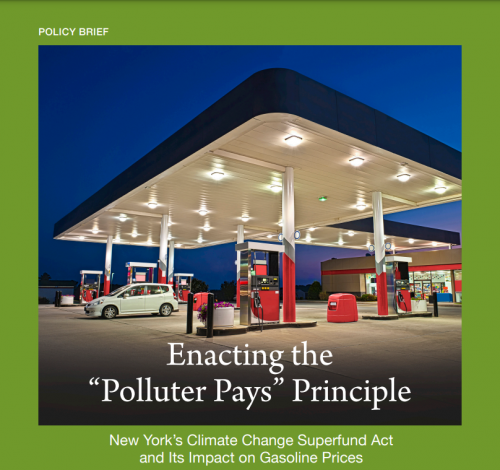
Enacting the “Polluter Pays” Principle
New York’s Climate Change Superfund Act and Its Impact on Gasoline Prices
This policy brief analyzes how New York State’s recently proposed Climate Change Superfund Act is most likely to affect consumer gasoline prices. The Act would require payments from fossil-fuel companies based on their historical contributions to current greenhouse gas levels in the atmosphere. The payments would be used to build green infrastructure to help the state adapt to climate change. The brief finds that the Act would likely have a negligible impact on current and near-term oil prices, while potentially lowering future energy prices in New York, including for transportation.
-
Who Knows What: Information Barriers to Efficient DER Roll-Out
Published in International Association of Energy, Environment and Economy Journal
While academic research on Distributed Energy Resources (DERs) has been mostly focused on first-best systems, we hypothesize that in reality multiple information barriers to efficient DER roll-out exist. We thus study the prevalence and importance of information issues arising in the context of deployment of DERs by reviewing the existing engineering and economic literature on distributed resources, analyzing DER-related regulatory proceedings, and surveying the relevant electricity sector stakeholders for their perception of information relevance and accessibility.
-
Comments on Resource Adequacy to NJ Board of Public Utilities
The New Jersey Board of Public Utilities (BPU) requested public input on its 2022 Progress Report on New Jersey's Resource Adequacy Alternatives, part of its continuing investigation into achieving New Jersey's resource adequacy and clean energy objectives. We submitted comments identifying specific recommendations for the BPU regarding the implementation of the proposals sets forth in the Progress Report. Among other recommendations, we encouraged the BPU to continue exploring the possibility of indexing renewable energy credits and clean energy attributes to the emissions intensity of displaced generation, identified various challenges associated with its proposal to introduce a market for clean capacity credits, and encouraged the BPU to carefully consider the preemption risk associated with its clean capacity credits market proposal.
-
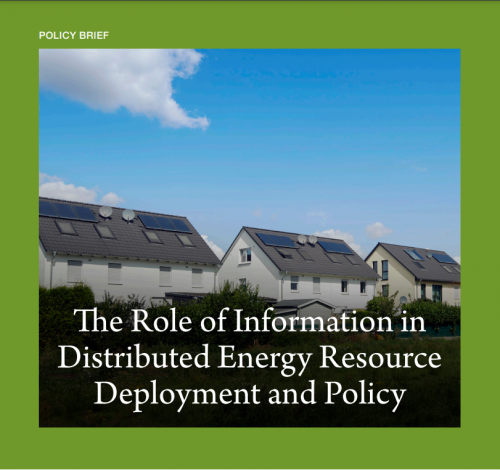
The Role of Information in Distributed Energy Resource Deployment and Policy
While appropriate compensation for DERs has received considerable attention in DER policy discussions, one important dimension has received less attention: informational gaps and asymmetries. In particular, key information about distribution networks, energy consumption, and marginal emission rates is often either entirely lacking or readily available only to some parties. Such information disparities can impede effective policymaking. To overcome the inefficiencies information asymmetry creates, regulators must carefully tailor disclosure mandates and incentives for utilities, as these actors often have little incentive to go beyond the letter of the law in data disclosure.
-
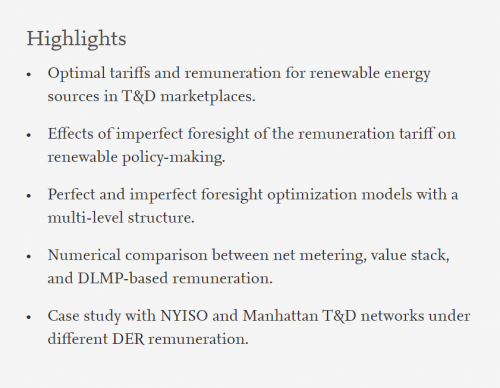
Impact of Imperfect Foresight on Optimal DER Deployment, Remuneration and Policy
Published in Applied Energy
This paper proposes a decision-making framework to optimize electricity tariffs and remuneration policy for renewable energy sources operating in transmission- and distribution-level (T&D) marketplaces. The authors develop perfect and imperfect foresight models with a multi-level structure to investigate the effects of the inability of actors to correctly predict future remuneration on the efficiency of the decisions made by policymakers.
-
Comments to Connecticut on Energy Storage and Emissions
The Connecticut Public Utilities Regulatory Authority (PURA) issued a straw program design for electric storage. We submitted comments that support PURA's efforts to make energy storage part of its overarching decarbonization agenda and provide feedback. It is important, as we explain, that PURA take into account the potential emissions consequences of energy storage operations in designing its performance-based incentive.
-
Comments to FERC on Transmission NOPR
We submitted comments to FERC providing recommendations for how it can clarify and improve reforms proposed in its Notice of Proposed Rulemaking addressing transmission planning and cost allocation. If finalized, the rulemaking would require planning entities to undertake long-term transmission planning. Our comments recommend that FERC clarify (at a high level) what it means to undertake long-term planning over a 20-year time horizon. We also recommend more specific improvements that can be made, including providing minimum uniform requirements on model specifications and scenario planning based on best practices; instituting administrative guardrails to protect transmission customers from excessive costs if the Commission moves forward with its proposed Right of First Refusal; and mandating a uniform set of core benefits that all planners must consider.
We also submitted reply comments in the proceeding to underscore two points. In response to commenters that argued the Commission should reconsider its proposal in light of the level of uncertainty surrounding the future, we argue that it is future uncertainty that necessitates the long-term scenario planning contemplated by the rule. Such proactive transmission planning will allow planners to prepare for and react to changing circumstances and ensure a reliable and resilient grid in the face of uncertainty. Additionally, our reply comments reaffirm previous recommendations that the Commission should require planners to use a standardized cost-benefit analysis that properly accounts for societal benefits of new transmission.
-
Amicus Brief in Support of Upholding PJM’s Focused Minimum Offer Price Rule
Last July, PJM Interconnection (the electricity grid operator for 13 states and the District of Columbia) submitted revisions to its Minimum Offer Price Rule (MOPR) for its capacity market to the Federal Energy Regulatory Commission (FERC) for approval. The new rule (the “Focused MOPR”) would remove an artificial barrier to market entry for resources that receive such externality payments under state climate and clean energy policies. Policy Integrity filed an amicus brief in support of FERC and PJM’s Focused MOPR explaining why the rule is welfare-enhancing and would not threaten reliability.
-
Efficiency in Wholesale Electricity Markets: On the Role of Externalities and Subsidies
Published in Energy Economics
In our article published in Energy Economics, we use economic modeling to analytically show the relationship between generation subsidies and energy and capacity markets. We show that the feared capacity price suppression can happen only under limited circumstances and that in the short-run, the subsidies will tend to increase capacity prices. We also demonstrate that while subsidies cannot produce the first-best outcomes, there exists a range of welfare-enhancing subsidy rates and designs that improve welfare, such that regulators should think of subsidies as one of the tools available for increasing electricity market efficiency.
-
Comments on New York PSC’s Grid Planning Process
New York's electric utilities have developed a coordinated grid planning process and an updated approach to analyzing the benefits and costs of infrastructure investments. Policy Integrity filed comments urging the Commission to recognize that compliance with the Climate Act in relation to grid planning requires, at the very least, consideration for planning decisions' impacts of global and local pollutants.
Viewing recent projects in Electricity

